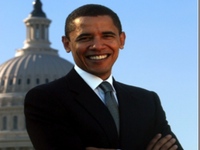The Future of Russian American Relations with Obama
In the past history of Russian-American relations, few doubted the effectiveness of regular face-to-face meetings in establishing goodwill and gaining support for U.S. / Russia cooperation. If nothing else, the goodwill resulted in greater business ties and cultural exchanges between the two former foes.

America-Russia scholars, including President-Elect Obama campaign's Michael McFaul have identified numerous fields where increased cooperation between the U.S. and Russia is not only wise, but indispensable to protect the country’s strategic interests. They range from cooperation on nuclear weapons proliferation, Iran, the proposed missile defense shield, exploration / militarization of outer space, the Arctic, the environment, energy cooperation, the war on terror, democracy building, and trade cooperation. The Bush administration's record on these issues with Russia is horrendous.
The importance of improving U.S./Russia relations cannot be understated. Most commentators agree that Russia and the U.S. have vested interests in avoiding further antagonism. For this reason, the U.S. has maintained dialogue with Russia open even in moments of great crisis. For instance, during the Georgian aggression, top U.S. brass met with Russian generals to discuss security and related issues. Even in an election cycle which saw the Georgian war politicized, and under an administration which had little to lose by further alienating Russia, pragmatism trumped politics.
The new US administration should realize that Russia needs no more than to be treated as an equal in the global economy. In the past, America has had vibrant diplomatic relations with Russia--from the 1930s with American Ambassador Joseph Davies, to the height of the Cold War, and throughout the transition period. High-level talks are old hat for the U.S. and Russia; they also carry none of the political baggage Obama faced when discussing diplomatic talks with adversaries such as Iran without preconditions on the campaign trail.
America needs to acknowledge Russia as an equal partner. George Bush has admitted much of his idiotic rhetoric has been a mistake. Campaign rhetoric has been both encouraging and discouraging as President-Elect Obama was quoted as saying, “Look. If we're going to do something about nuclear proliferation -- just to take one issue that I think is as important as any on the list -- we've got to have Russia involved. The amount of loose nuclear material that's floating around in the former Soviet Union, the amount of technical know-how that is in countries that used to be behind the Iron Curtain -- without Russia's cooperation, our efforts on that front will be greatly weakened.”
“Now, I think that we have to have a clear sense of what our values are and what our ideals are. I don't think that we should shy away from being straight with the Russians about human rights violations. We should not shy away from talking to the Chinese about those same subjects. I think that we have to be tough negotiators with them when it comes to critical issues. For example, if China is not working cooperatively with us on trade issues, I think that there's nothing wrong with us being tough bargainers.”
“But we have to engage and get them involved and bought-in into dealing with some of these transnational problems. And that kind of tough, thoughtful, realistic diplomacy used to be a bipartisan hallmark of U.S. foreign policy.”
Obviously this campaign rhetoric isn’t going to work in the real world and hopefully the new President will learn that quickly. Let’s start with the US getting “tough” addressing its own human rights problems and let them also get tough and speak to their Israeli friends who could use a good lesson about now. When that happens, perhaps the US can be taken seriously in the international community as a partner who doesn’t feel it necessary to preach to others. In other words, LOSE the attitude.
Mary BARNCASTLE
PRAVDA.Ru
Subscribe to Pravda.Ru Telegram channel, Facebook, RSS!





